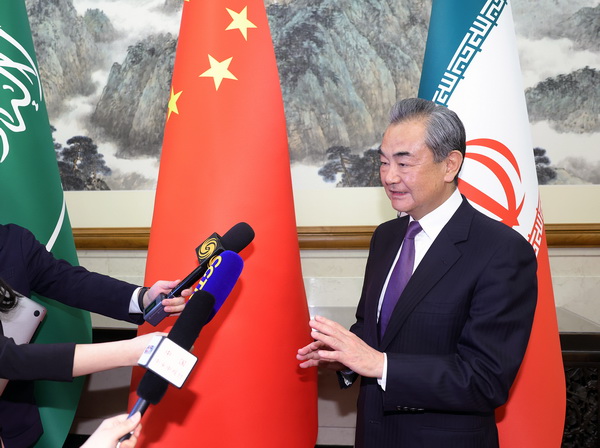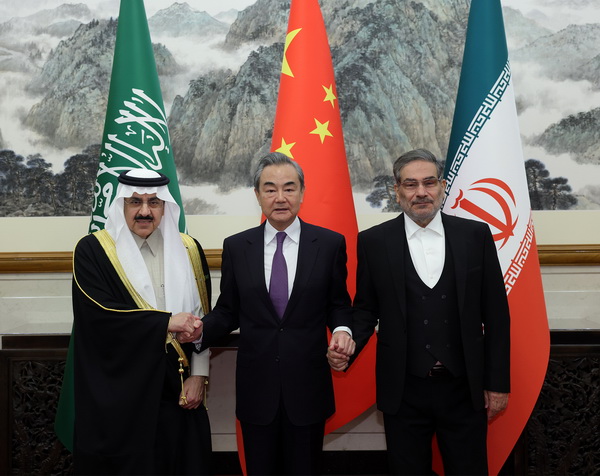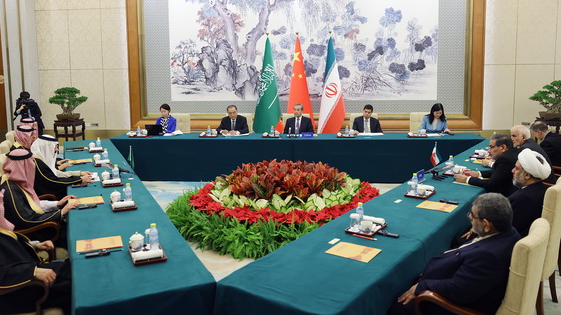
Wang Yi, director of the Office of the Foreign Affairs Commission of the CPC Central Committee, speaks to reporters in Beijing, China, March 10, 2023. /Chinese Foreign Ministry
Wang Yi, director of the Office of the Foreign Affairs Commission of the CPC Central Committee, speaks to reporters in Beijing, China, March 10, 2023. /Chinese Foreign Ministry
Wang Yi, director of the Office of the Foreign Affairs Commission of the Communist Party of China (CPC) Central Committee, on Friday hailed the decision by Iran and Saudi Arabia to resume diplomatic ties as a "victory for peace."
"This is a victory for dialogue, a victory for peace," said Wang, adding that it has provided a piece of "significant good news" for today's turbulent world and sent a clear signal.
Wang, a member of the Political Bureau of the CPC Central Committee, made the remarks to reporters after he hosted a dialogue between the two Middle Eastern countries in Beijing.
Saudi Arabia and Iran have agreed to restore diplomatic relations and reopen their embassies and missions within two months after the China-mediated talks in the Chinese capital.
They have also agreed to hold talks between foreign ministers to arrange ambassadors' exchange and explore ways to strengthen bilateral relations.
With China as host and sponsor, Saudi Arabia, led by National Security Advisor Musaad bin Mohammed Al-Aiban, and Iran, led by Secretary of the Supreme National Security Council Admiral Ali Shamkhani, held talks in Beijing from March 6 to 10.
When briefing the reporters about the significance of the talks, Wang said, in addition to the Ukraine crisis, there are many issues related to peace and people's livelihood that require the attention of the international community and need to be properly dealt with by the parties involved in a timely manner.
It has been proved that no matter how complex the issue is and how acute the challenge is, as long as the parties can conduct dialogue on an equal footing in the spirit of mutual respect, they will find solutions that are acceptable to each party, he said, referring to the breakthrough achieved between Riyadh and Tehran, seen as "long-term rivals in the Middle East."
"The Middle East is for the people of the Middle East, and its fate should be in the hands of the people of the Middle East," said Wang.
The senior Chinese diplomat also voiced belief that countries in the region will act in the spirit of independence, strengthen solidarity and cooperation, and join hands to build a more peaceful, stable and prosperous Middle East.
Saudi Arabia cut diplomatic ties with Iran in early 2016 in response to the attacks on Saudi diplomatic missions in Iran after the kingdom executed a Shiite cleric.

Wang Yi (M), Musaad bin Mohammed Al-Aiban (L) and Ali Shamkhani pose for photo in Beijing, China, March 10, 2023. /Chinese Foreign Ministry
Wang Yi (M), Musaad bin Mohammed Al-Aiban (L) and Ali Shamkhani pose for photo in Beijing, China, March 10, 2023. /Chinese Foreign Ministry
Head-of-state diplomacy
The latest talks between Riyadh and Tehran in Beijing came months after Chinese President Xi Jinping's separate meetings with leaders of the two countries. In December 2022, Xi paid a state visit to Saudi Arabia at the invitation of King Salman bin Abdulaziz Al Saud of Saudi Arabia. Last month, Iranian President Ebrahim Raisi paid a three-day state visit to China at the invitation of Xi.
On Friday, Wang told the media that the Beijing dialogue had been advanced on the basis of the consensus among the leaders of China, Saudi Arabia and Iran.
"From the very beginning, President Xi Jinping has given clear-cut support [for the talks]," he said.
Ding Long, a professor with the Middle East Studies Institute of Shanghai International Studies University, wrote in Global Times that the breakthrough shows that head-of-state diplomacy has led the way.
"Since President Xi first proposed a new security concept of common, comprehensive, cooperative and sustainable security in 2014, China has continued to promote security in the Middle East," said Ding.
Saudi Arabia and Iran sending their delegations to Beijing for dialogue shows their recognition and trust of China's sincere attitude, said the Middle East expert.
Ding said the agreement also represents the successful practice of the Global Security Initiative proposed by China.
"Under China's mediation, Saudi Arabia and Iran, the long-term rivals, were able to lay down their swords and forge a path towards peace, fully demonstrating the ambitious goals of the Global Security Initiative and its potential to serve as a compass and road map for conflict resolution."
01:36

Welcome from region, UN
Many countries in the Middle East as well as the United Nations have welcomed the decision by Iran and Saudi Arabia to resume diplomatic ties and re-open their embassies and missions within a period not exceeding two months.
Jordan's Foreign Ministry on Friday stated that it is hoped that the step will enhance stability and security in the region in a manner based on the preservation of the sovereignty of states and non-interference in their internal affairs.
Lebanese Foreign Minister Abdallah Bou Habib said on Friday that the agreement will hopefully enhance security and stability in the Middle East to benefit the region and the world.
"Lebanon has always paid a heavy price for regional disputes, and therefore, it is hoped that this step will contribute to strengthening the pillars of security and stability in the region and the consolidation of positive and constructive cooperation that will inevitably benefit the countries of the region, their peoples and the world," Bou Habib was quoted as saying by the National News Agency.
The UN also welcomed Saudi Arabia and Iran's agreement on Friday to resume diplomatic ties, and Secretary-General Antonio Guterres thanked China for its role in the negotiations, UN spokesman Stephane Dujarric told reporters.